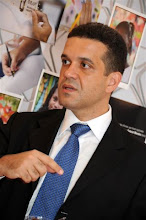- Back to Home »
- Advanced Energy Initiative
 Sugarcane is an economically very important culture in Latin America, including Brazil. This country is one of the largest sugar producers, and is responsible for 35% (5.8 millions hectares) of the sugarcane culture in the world. In addition, the Brazilian alcohol program (Proalcohol) is an important alternative to fossil fuels, which makes the country to save approximately 260,000 barrels of petrol per day. Brazilian sugarcane varieties can grow with low addition of nitrogen fertilizers; nevertheless, this culture still consumes 240,000 ton of nitrogen per year, which represents high cost and also contributes to ground water pollution and atmospheric problems through release of NH3 and NO2 (Döbereiner et al., 1995).
Sugarcane is an economically very important culture in Latin America, including Brazil. This country is one of the largest sugar producers, and is responsible for 35% (5.8 millions hectares) of the sugarcane culture in the world. In addition, the Brazilian alcohol program (Proalcohol) is an important alternative to fossil fuels, which makes the country to save approximately 260,000 barrels of petrol per day. Brazilian sugarcane varieties can grow with low addition of nitrogen fertilizers; nevertheless, this culture still consumes 240,000 ton of nitrogen per year, which represents high cost and also contributes to ground water pollution and atmospheric problems through release of NH3 and NO2 (Döbereiner et al., 1995).
As early as 1975 - during the world oil crisis - Brazil developed and implemented what became the world's most extensive programme to date for replacing conventional fuels in its Proalcohol programme; for a time, up to 80% of the nation's cars were fuelled by ethanol from sugar cane. At an annual production of twelve to fourteen million cubic metres, Brazil is still the world's largest producer and consumer of ethanol. Although the number of alcohol-driven vehicles fell drastically during the nineties, there has been increasing interest for cars launched onto the Brazilian market a year ago that can run on ethanol, conventional octane-based fuel or both in any mixture. In 2005, the national production of sugarcane had an increase of 4,85% in relation to the previous year, reaching 436 000 000 tons, what can be credited to the prices behavior of alcohol and sugar. In the state of São Paulo, main national producer, with about 57,69% of the country production, had a 5,1% growth, totalizing 251 528 400 tons. Seven of the 10 bigger producing cities of Brazil, belong to this Unit of the Federacy. The main Brazilian producing city is Morro Agudo, situated in the northeast region of the state.
In 2005, the national production of sugarcane had an increase of 4,85% in relation to the previous year, reaching 436 000 000 tons, what can be credited to the prices behavior of alcohol and sugar. In the state of São Paulo, main national producer, with about 57,69% of the country production, had a 5,1% growth, totalizing 251 528 400 tons. Seven of the 10 bigger producing cities of Brazil, belong to this Unit of the Federacy. The main Brazilian producing city is Morro Agudo, situated in the northeast region of the state.
The area planted with sugarcane in Brazil increased of 5,625 million hectares, in harvest 2004-2005, for 5,877 million hectares, in harvest 2005-2006, continuity to a trend that comes verifying in the last ten years. In this period, the planted area grew 28.9% and the production increased 43,8%. The sugarcane is the second culture, in terms of production value, and comes gaining new investments in the last years. The recovery of the alcohol price was stimulated in reason of a better demand of the flexfuel (gas/alcohol) cars. Another important fact: the alcohol combustible exportations had been greater than industrial alcohol for the first time in history, corresponding about 60% of the total. In respect to the external sector, seeming favorable to the Brazilian product safeguard the World Trade Organization (WTO) acted against the subsidies granted in European Union (UE) for the sugar exportation, contributing for this positive picture.
The sugarcane is the second culture, in terms of production value, and comes gaining new investments in the last years. The recovery of the alcohol price was stimulated in reason of a better demand of the flexfuel (gas/alcohol) cars. Another important fact: the alcohol combustible exportations had been greater than industrial alcohol for the first time in history, corresponding about 60% of the total. In respect to the external sector, seeming favorable to the Brazilian product safeguard the World Trade Organization (WTO) acted against the subsidies granted in European Union (UE) for the sugar exportation, contributing for this positive picture.












